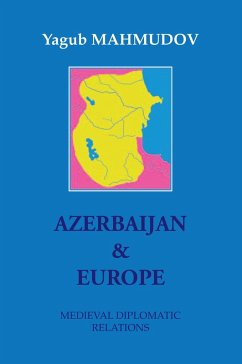The book of a well known Azerbaijani historian Yagub Mahmudov "Azerbaijan and Europe" is dedicated to interesting events of history of relations between Azerbaijan and Europe. This book considered for English readership is published in Europe for the first time. Azerbaijan gaining independence in the process of collapse of the Soviet Empire achieved vital successes in establishment of a democratic, legal and worldwide state. Though 20% of lands are under occupation and more than a million refugees in Azerbaijan it is being integrated to European and world union successfully. Azerbaijan Republic at present has become a leader state in Southern Caucasus. Azerbaijan nation has a rich and very old history. Historical Azerbaijan lands have a suitable geographical location and from ancient times our land was the historic place where different civilizations, cultures and religions joined. This country from ancient times had a significant linking role in relations among western and eastern nations. Azerbaijan nation is the successor of a state culture of about 5 thousand years. Powerful states established on historical lands of Azerbaijan had a wide trade and diplomatic relations with some countries of Asia and Europe since many years before our century. The primary sources approve that states of historical Azerbaijan such as Atropathena and Albania had diplomatic relations with the old Roman Empire. As stated in the book presented to readership by Yagub Mahmudov in the Middle Ages the Azerbaijan - European relations became more broadened and entered a new stage. In the times of Great Geographical Discoveries powerful Azerbaijan states - the Akkoyunlu and Safavi Empires about a period of 300 years had deep tracks in worldwide history. Western European states for the purpose to open back front - from Asia tried to use the Akkoyunlu and Safavi Empires. The Akkoyunlu and the Safavis located in the center of the Great Silk Way, were interested in establishment of wide trade relations with European countries. With this purpose Azerbaijani leaders Uzun Hassan (1468-1478), Sultan Yagub (1578-1590), Shah Ismail I(1501-1524), Shah Tahmasib (1524-1576), the Safavi emperor Abbas the Great (1587-1629) and others established wide relations with the European states. It is an interesting fact that beginning from the mid of the XV century Azerbaijani diplomats conducted negotiations with Venice, Rome, Naples, Germany, Hungary, Poland, Russia, England, Spain, Portugal, France, the Scandinavian countries and other European countries. In the 60-70s of the XV century in the palace of the great Azerbaijani leader Uzun Hassan there was a permanent embassy of the Republic of Venice. Mother of Uzun Hassan, a well known diplomat Sara Khatun had a great role in regulation of diplomatic relations with Western countries. Friendship policy of Uzun Hassan with European countries was continued by his son Sultan Yagub, his grandson Shah Ismail I and other Safavi emperors. In the period of the Safavi emperor Shah Abbas' reign these relations had become much broadened. In his book the historian Yagub Mahmudov has described the real history of this interesting diplomatic relations. The scientist in his work separately explains economic-political interests of the parties being in relation expressing his own subjective idea in this respect. The author brings in such issue his right position to his readers' notice. This is an irrefutable fact that after historical Azerbaijani lands been divided between Russia and Iran under Gulustan (1813) and Turkmenchay (1828) agreements Azerbaijan history is presented to the world as Russian and Iranian history. The history of the Akkoyunlu and the Safavi empires established by Azerbaijani-Turkish dynasties, even presented as a history of Iran. From this view point the book "Azerbaijan and Europe" published by us is of great importance to develop right idea about Azerbaijani history in European readership. We have no doubt
Dieser Download kann aus rechtlichen Gründen nur mit Rechnungsadresse in A, D ausgeliefert werden.









